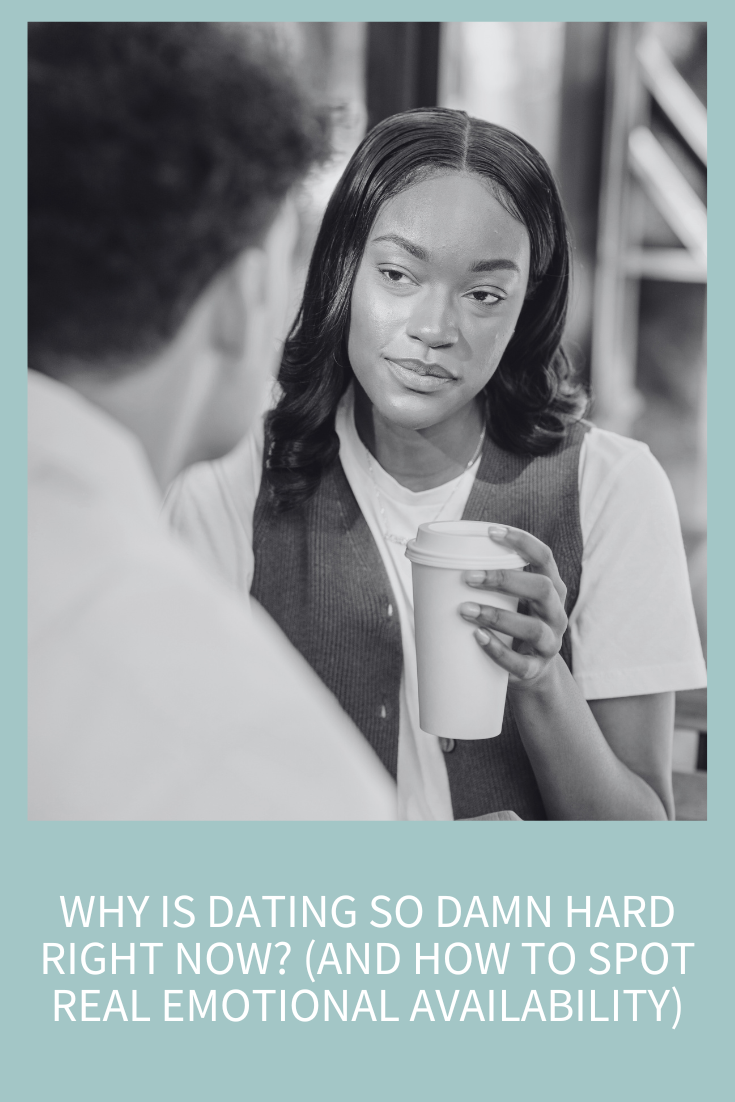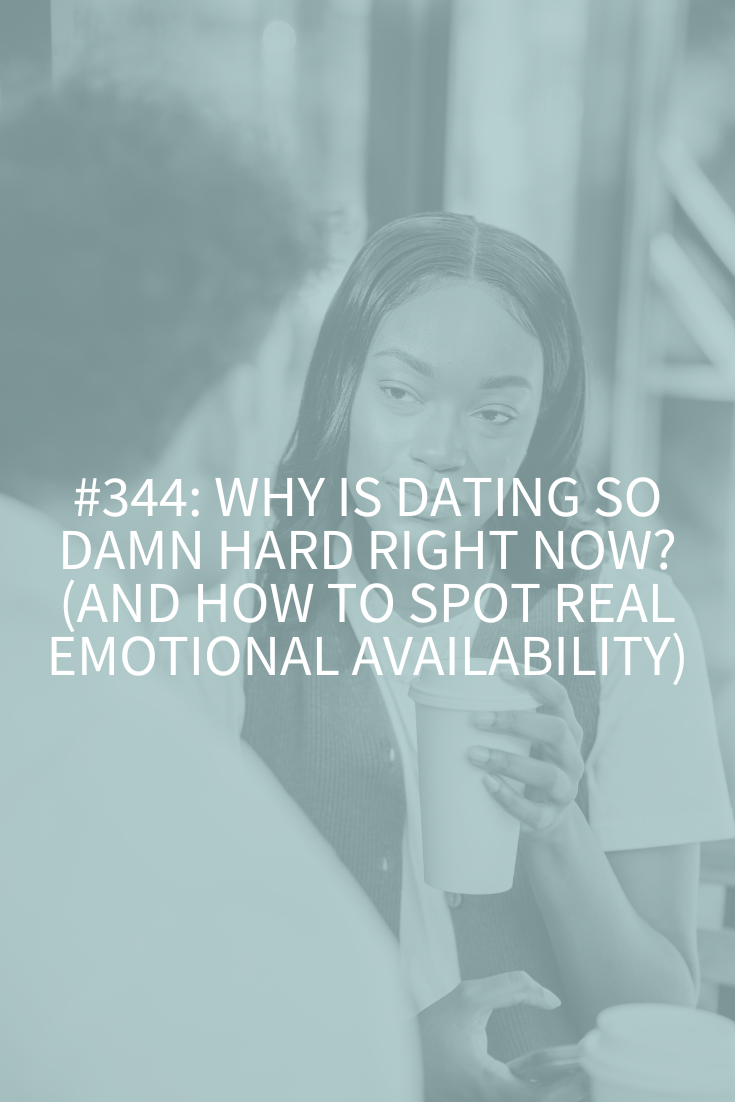
If you’ve been wondering whether dating is harder than it used to be, I’m here to tell you: yes. You’re not imagining things. It’s not just that you’re older, pickier, or doomed to attract commitment-phobes. The truth is, dating today has a unique set of challenges, most of which are designed to keep you swiping, second-guessing, and emotionally confused. But don’t panic. Today we’re going to break down why dating feels so hard right now (it’s not just you), what emotional availability really means, and what you can do to shift how you date so you stop wasting time.
9-minute read
Why Dating Feels So Hard Right Now
Let’s start at the beginning. From what I can tell from my personal experience and from the research, there are five main reasons dating feels hard right now.
1. The Paradox of Choice is Real
If you’ve never read it, Barry Schwartz wrote a famous book a while ago called The Paradox of Choice: Why More is Less, and that research has only gotten better and more on point. His (and others’) research shows that the more options we have, the harder it is to make a decision (and the more we regret whatever decision we do make). As you might imagine, this is a recipe for dating anxiety.
It used to be that you’d meet a few people in your lifetime and choose from those. But now, you’ve got apps offering thousands of profiles at your fingertips, so getting overwhelmed is way too easy. Instead of making thoughtful choices, we fall into what we psychologists call decision fatigue which is the fact that our ability to make sound decisions deteriorates after being faced with too many options. So people ghost not because they’re cruel necessarily, but because there are too many options. They go on three great dates and still wonder if “the one” is a scroll away.
2. Dating Apps are Designed for Dopamine, Not Connection
Apps like Tinder and Bumble are built on variable-ratio reinforcement, the same behavioral principle that makes slot machines addictive. You swipe, and occasionally you get a match. That match might message. That message might lead to a date. But the unpredictable nature of the reward keeps you hooked.
This process spikes dopamine, not oxytocin (the bonding hormone). So we feel excitement but not necessarily connection. Worse, we often conflate this chemical buzz with compatibility. The result? We chase sparks, not substance.
Example: You match with someone, chat for days, but they cancel your first date last minute with a vague excuse. Your brain may still crave the high of what could’ve been, even though the reality is inconsistent effort.
3. Attachment Wounds Are Loud Right Now
I’ve discussed attachment theory quite a bit. And newer research (in the last five years) is really helping explain why we repeat painful dating patterns. In modern dating, avoidant attachers are overrepresented, especially on apps. They prefer casual interactions that don’t demand vulnerability. They might disappear after connection deepens, blame “timing,” or keep relationships in limbo.
Meanwhile, research shows that anxious attachers often mistake inconsistency for excitement. They’re drawn to emotionally unavailable people because unpredictability activates the nervous system in a way that feels familiar, if not safe. An anxiously attached person might feel butterflies because someone’s hot and cold. That’s not chemistry, it’s nervous system dysregulation masquerading as romance.
4. We’re Communicating More, but Connecting Less
A 2023 study found that while digital communication has skyrocketed, interpersonal satisfaction has not. We’re texting, DMing, and voice-noting at all hours, but often in ways that avoid depth. Real intimacy requires presence, tone, and vulnerability, all things that are hard to access in a stream of emojis and “wyd?” (what are you doing?) messages.
Saying “I’m bad at texting” is sometimes code for “I’m not invested enough to be consistent.” And when we start relationships with this foundation, emotional safety is shaky from the start. Or you might be having deep late-night text convos, but they never want to talk on the phone or plan a real date. That’s not intimacy, it’s convenience.
5. Post-Pandemic Dating Fatigue
The COVID-19 pandemic rewired how we relate to ourselves and others. Some people emerged from isolation with a hunger for real partnership. Others became more anxious, avoidant, or hesitant to invest emotionally. And I think many people became conflict avoidant to a pathological level. Many experienced increased loneliness and social anxiety, which has made vulnerability feel more dangerous than ever.
In a 2022 survey by Match.com, over 70% of singles said they felt “burned out” by dating. Emotional availability has become a scarce commodity, not because people don’t want to connect, but because many are still healing.
What Emotional Availability Actually Means
This term gets thrown around so often that it’s lost clarity. So let’s get precise.
Emotionally available people:
- Can name and regulate their own emotions (this doesn’t mean they’re Zen monks, it means they know what they’re feeling and don’t lash out or shut down)
- Are open to understanding your experience, even when they disagree
- Are consistent in what they say and do
- Can tolerate emotional discomfort and stay present
- Are self-reflective, willing to own their part and work through conflict
Emotionally unavailable people:
- Might talk about feelings but avoid true vulnerability (like sharing fears or needs)
- Often go silent, make excuses, or withdraw when emotional stakes rise
- Chase novelty and then disappear when things feel too real
- Blame exes, bad luck, or their “busy schedule” instead of owning their behavior
For example, someone might tell you, “I’m not ready for a relationship right now,” but wants to sleep together, text daily, and get emotional support. That’s emotional unavailability dressed up as “being honest.”
I’m offering a free Emotional Availability Assessment with this week’s episode. In it, you’ll take a short quiz to assess your emotional availability as well as the person you’re dating.
How to Spot Emotional Availability (Green Flags)
Here are signs that someone’s emotionally available:
- Follow-through: They don’t leave you wondering. If they say they’ll call, they call. If they’re late, they tell you. You’re not playing detective.
- Real curiosity: They ask meaningful questions and genuinely want to understand your world. They don’t just nod through your answers, they remember and follow up.
- Emotional courage: They’re willing to talk about tough stuff, including how they feel about their ex, why their last relationship ended, and what scares them in love.
- Boundary respect: If you say you need to slow down or aren’t ready for something, they don’t guilt you or push. They meet you where you are.
- Healthy pacing: They’re not trying to fast-forward into love or keep things vague forever. They co-create the rhythm with you.
What You Can Do Differently
You can’t control who’s on the apps or how flaky someone is. But you can absolutely shift your own patterns. Most importantly, stop obsessing over whether they like you. The question is: Do you like you when you’re around them?
1. Shift the internal question
If your brain is constantly asking, “Do they like me?” you’re in performative mode. You’re molding yourself to be likable rather than assessing whether this person fits your needs, your values, or your emotional rhythm. Flip it: “How do I feel when I’m with them?” “Do I feel safe and respected?” “Am I shrinking or second-guessing myself?” Also, think of how you feel when you’re away from them. Am I insecure, anxious or serene?
When you focus on your own internal experience instead of managing theirs, you start showing up authentically. That’s when real connection becomes possible.
2. Regulate before you relate
Your nervous system is your best dating coach. If you’re dysregulated (anxious, overly excited, reactive, or checked out) you’ll miss red flags or chase chaos that feels familiar. Before you reach out to someone or respond to a text, pause. Breathe. Ask: “Am I grounded right now?”
Practices like breathwork, body scans, or simply naming your emotion (“I’m feeling lonely and impulsive”) give you a beat to respond instead of react. Think of it as nervous system hygiene. Dating from a place of regulation protects your peace.
3. Chemistry isn’t compatibility
Butterflies aren’t a goal or your friend. That intense spark might be your trauma talking. Our nervous systems often recognize old wounds as “attraction.” But real compatibility feels like calm curiosity, not heart-pounding obsession. You might be trauma bonding and not realize it.
If I asked you why you liked this person, you should be able to come up with specific, clear responses such as “she’s kind and I can tell she’s really listening” or “he always has my back, I like that he’s able to state his needs while also asking about mine.” If your responses are more vague, such as “I’ve just never felt this way before” or “there’s just something about them,” then you’re likely trauma bonding.
Ask yourself: Do I feel more like myself with this person, or less? Do I feel inspired to grow, or constantly unsettled and uncertain? If your connection feels exciting but also confusing, it’s likely a red flag dressed as romance.
4. Ask deeper, more revealing questions
Move beyond favorite movies and job titles. Ask: “What’s something you’ve worked through that made you stronger?” or “What do you need when you’re having a hard day?” Their answers tell you more than any profile ever will. It’s not about rapid-fire intimacy, it’s about emotional fluency. How self-aware are they? Can they name feelings, reflect on past relationships, or talk about boundaries?
And don’t just ask them good questions, ask yourself too. After a date, journal: “What did I learn about me?” “Did I feel energized or drained?” “Did I feel I could be honest?”
5. Practice radical self-honesty
It’s easy to get swept up in the potential of someone. But part of dating well is getting honest about what you’re tolerating. Are you making excuses for inconsistency? Are you telling yourself you’re OK with casual when you really want commitment? Don’t judge yourself, just notice. Self-awareness is your superpower.
6. Keep a connection journal
This is one of my favorite tools. After each interaction (even texts), jot down how you felt before, during, and after. Over time, patterns emerge. You’ll start to notice who brings peace, who triggers anxiety, and who leaves you wondering what you did wrong. The goal? Data. Not drama.
7. Remember: you’re the prize
Dating is not about getting picked. It’s about picking someone who’s a match for your wholeness, not your loneliness. When you’re rooted in self-worth, your standards shift. You don’t chase, you choose.
Wrap-Up
Yes, dating can be hard but you’re not powerless. Dating feels harder because it is harder, but also because our internal compasses need recalibrating. We’ve been taught to chase attraction over alignment, performance over presence.
You need to tune into your own clarity, slow down your nervous system, and stop mistaking anxiety for affection. You can start showing up differently today.
For the One Love Collective Community
Tier I:
- Journaling Prompts
- Conversation Starters That Reveal Emotional Availability
- Nervous System Check-In Tracker
Tier II:
- Boundary Clarity Worksheet: What You’re Available For (and What You’re Not)
- Guided visualization
- When Dating Feels Like Rejection
Tier III:
- Connection Journal Template
- Are You Dating from Self-Worth or Self-Doubt? Quiz
- Reframing Chemistry Worksheet: Is It Excitement or Emotional Safety?
Resources for Why Is Dating So Damn Hard Right Now? (And How to Spot Real Emotional Availability)
How Your Attachment Style Affects Your Personal Relationships
Are You Trauma Bonding in Your Relationships and Don’t Realize It?
The Four Reasons Self-Awareness is the Most Important Thing in Your Relationship






